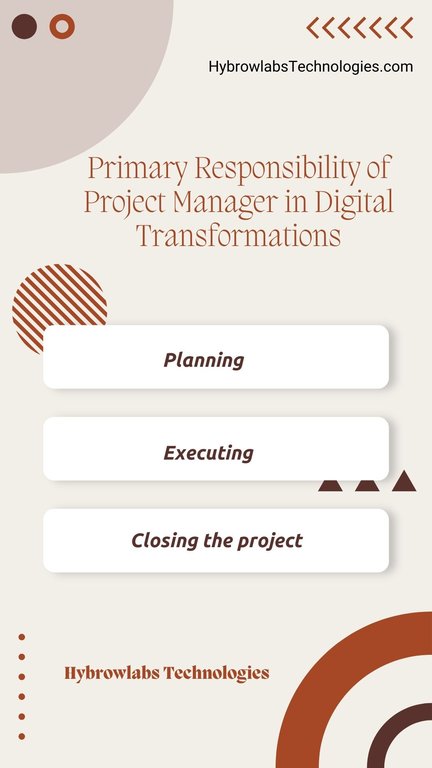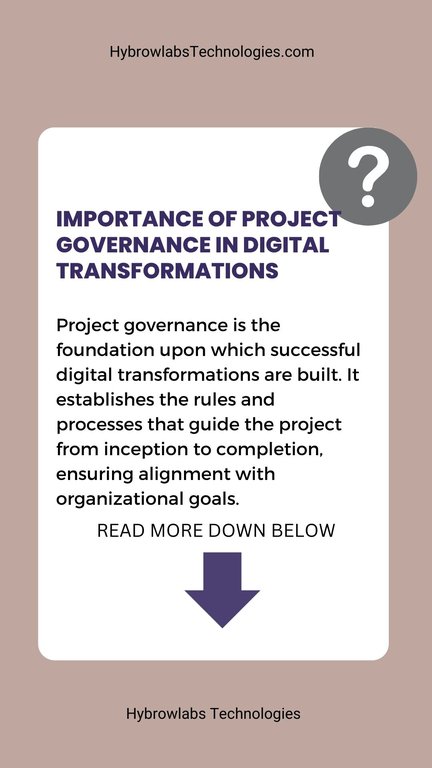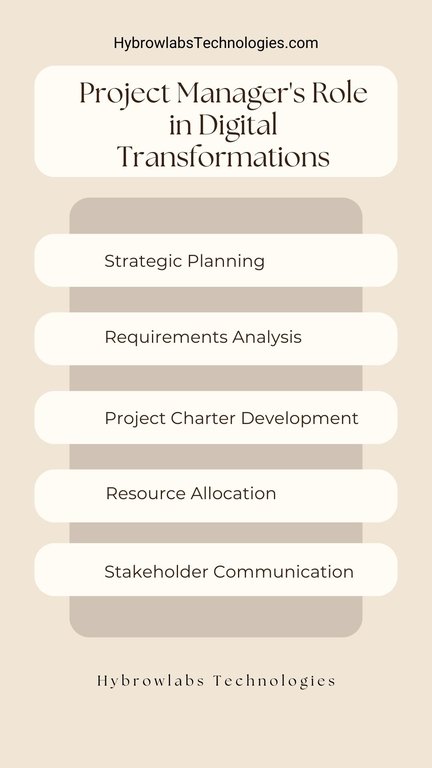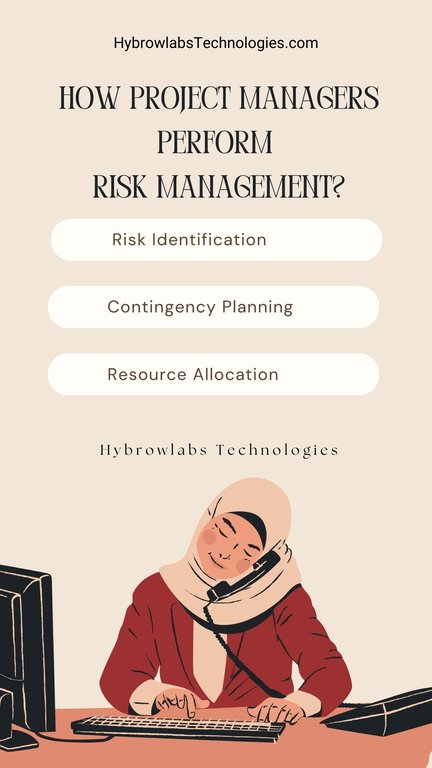In the rapidly evolving landscape of business and technology, the role of a project manager in digital transformations and ERP implementations has never been more significant. While the task may be complex, the role of a project manager is equally rewarding. This article explores the multifaceted role of project managers in these critical processes, shedding light on the essential functions they perform and addressing common questions that often surround their responsibilities.
Defining the Project Manager Role

A. The Essential Functions of a Project Manager in Digital Transformations
Project managers are the linchpin in any digital transformation project. Their primary responsibilities encompass planning, executing, and closing the project. They ensure that the project's objectives are met within the defined constraints of scope, time, and cost.
B. Addressing Common Questions about the Project Manager's Role
In the dynamic field of project management, newcomers and even seasoned professionals often seek clarity regarding the precise duties of a project manager. We will explore these responsibilities in detail, providing a comprehensive understanding of their role.
Project Governance

A. The Importance of Project Governance in Digital Transformations
Project governance is the foundation upon which successful digital transformations are built. It establishes the rules and processes that guide the project from inception to completion, ensuring alignment with organizational goals.
B. Development of a Project Charter as a Guidebook for Project Execution
A project charter is akin to the manifesto of a transformation project. It outlines the project's goals, objectives, roles, responsibilities, and parameters for decision-making. Project managers collaborate with stakeholders to craft a representative charter.
C. Collaboration with Stakeholders to Create a Representative Project Charter
Effective project governance is a collaborative effort. Project managers engage with stakeholders and business owners to ensure that the project charter reflects the organization's direction and aspirations.
D. The Evolving Nature of Project Governance Throughout the Project's Lifecycle
Project governance is not a static document but an evolving one. Project managers must adapt to changing circumstances and continuously update the charter as the project progresses and pivots.
Management and Leadership in Digital Transformations
A. Distinguishing between Management and Leadership in Project Management
| Aspect | Management | Leadership |
| Definition | The tangible and practical aspects of planning, organizing, and controlling project activities, resources, and budgets. | The ability to inspire, guide, and align project teams and stakeholders with the project's vision and goals. |
| Focus | On tasks, processes, and outcomes. | On people, relationships, and the project's overarching purpose. |
| Orientation | Short-term, ensuring that tasks are completed within the defined scope, time, and cost constraints. | Long-term, emphasizing the project's broader strategic goals and its alignment with the organization's mission. |
| Decision-Making | Involves making decisions based on data and established procedures. | Requires making decisions that are often less structured and involve considering the impact on the project team's motivation and cohesion. |
| Control | Concerned with maintaining control over the project's processes and ensuring compliance with plans and budgets. | Involves guiding, motivating, and influencing team members and stakeholders to achieve project objectives. |
| Measures of Success | Success is often measured by how efficiently the project stays on schedule and within budget. | Success is measured by the team's ability to work collaboratively and innovate, ultimately achieving the project's strategic goals. |
| Communication | Primarily involves conveying project-related information, progress reports, and ensuring that tasks are completed as planned. | Requires effective communication that inspires, motivates, and aligns the team with the project's vision, creating a shared sense of purpose. |
| Skill Emphasis | Emphasizes technical and organizational skills, risk management, and task-focused abilities. | Emphasizes interpersonal skills, emotional intelligence, vision, and the ability to create a positive team culture. |
| Examples | Creating Gantt charts, tracking budgets, and monitoring task completion. | Providing inspiration, setting a vision, and resolving conflicts within the team. |
B. Tangible Aspects of Management: Tracking Activities, Resources, and Budget
The project manager's role in managing project activities, resources, and budgets is pivotal. This hands-on approach ensures that tasks are completed within the stipulated time and cost, while meeting quality standards.
C. The Intangibles of Leadership: Aligning Project Goals, Teams, and Executive Leadership
Leadership, on the other hand, revolves around ensuring alignment between the project, the project team, and the executive leadership. It's about guiding teams toward a common vision and ensuring everyone understands how their work contributes to the project's success.
The Project Manager's Role in Digital Transformations and ERP Implementations

- Strategic Planning: Project managers play a fundamental role in defining the strategic vision for digital transformations and ERP implementations. They work closely with top-level management to align project goals with the organization's overarching objectives.
- Requirements Analysis: Understanding the unique needs and goals of the organization is essential. Project managers lead the process of requirements analysis, ensuring that the chosen digital solutions are tailor-fit to address these needs effectively.
- Project Charter Development: They craft a project charter that outlines the scope, objectives, timelines, budgets, and expected outcomes. This charter serves as the project's guiding document and garners buy-in from all stakeholders.
- Resource Allocation: Managing resources, both human and financial, is a critical task. Project managers ensure that the project has the necessary resources to operate efficiently, whether that involves hiring skilled professionals or allocating budget appropriately.
- Risk Management: Identifying potential risks and developing strategies to mitigate them is paramount. From data security concerns to potential disruptions during the implementation phase, project managers are adept at risk management.
- Stakeholder Communication: Effective communication is central to project success. Project managers facilitate clear and open lines of communication among all stakeholders, ensuring everyone is informed and aligned with the project's progress.
- Change Management: Digital transformations and ERP implementations often require significant changes in processes and workflows. Project managers guide the organization through these transitions, ensuring that employees adapt seamlessly to the new systems.
- Timeline Management: Staying on schedule is critical. Project managers are masters of time management, adjusting timelines and ensuring that the project progresses according to the plan.
- Budget Control: They are responsible for developing and adhering to a budget for the project. When deviations occur, they manage the financial aspects of the project with prudence.
- Quality Assurance: Ensuring that the digital transformation or ERP system functions as intended is paramount. Project managers develop strategies for quality assurance, conducting testing and validation procedures to guarantee the system's efficacy.
- Training and Knowledge Transfer: As systems are implemented, project managers oversee the training of staff to ensure they can effectively use the new digital tools. They also facilitate knowledge transfer to ensure long-term system maintenance.
- Monitoring and Evaluation: After implementation, project managers continue to monitor the system's performance, ensuring it meets its intended objectives. If necessary, they adjust and fine-tune the system.
- Documentation: Project managers maintain detailed documentation of the project's progress and outcomes. This documentation is valuable for post-project assessments and for future reference.
- Continuous Improvement: A project manager's work is not complete when the project is implemented. They engage in a cycle of continuous improvement, seeking ways to enhance the system's performance and the organization's operational efficiency.
The Impact of a Competent Project Manager
The role of a project manager in digital transformations and ERP implementations cannot be overstated. Their proficiency in strategic planning, resource management, risk mitigation, and change management significantly influences the project's success. Their guidance ensures that the chosen digital solutions align with the organization's needs and goals, ultimately enhancing operational efficiency and competitiveness.
In a world where adaptability and efficiency are critical for businesses, project managers are the linchpin for successful digital transformations and ERP implementations. Their ability to lead, plan, communicate, and manage resources is the driving force behind these complex, transformative initiatives. The impact of a competent project manager is felt not only during the implementation phase but in the organization's long-term success.
The Project Manager's Role in Problem Solving
One of the most crucial skills a project manager possesses is their ability to tackle challenges head-on. They are, in essence, problem solvers. Projects rarely go exactly as planned, and unexpected issues can arise at any moment. The project manager's role is to handle these challenges with grace, finding innovative solutions to keep the project on track.
- Critical Thinking: Project managers excel in critical thinking. They assess problems from various angles, identify their root causes, and develop effective strategies to address them. Their ability to think on their feet and make informed decisions is invaluable.
- Adaptability: Change is a constant in the world of project management. Project managers are not only adaptable themselves, but they also guide their teams through transitions. They ensure that everyone remains focused on the project's goals, even when the path takes unexpected turns.
- Conflict Resolution: When different team members have conflicting opinions or when issues arise between stakeholders, the project manager steps in as a mediator. They facilitate discussions, find common ground, and ensure that conflicts do not hinder progress.
Communication Mastery: The Key to Success
Effective communication is at the heart of every successful project. A project manager is not only a skilled communicator but also a master of interpersonal relationships. Here's how they excel in this area:
- Clear and Open Lines of Communication: Project managers establish and maintain clear communication channels among team members, stakeholders, and clients. They ensure that everyone is informed and up to date, preventing misunderstandings and miscommunications.
- Listening Skills: Good communication is a two-way street. Project managers are active listeners. They take the time to understand the concerns and ideas of their team and stakeholders. This fosters collaboration and trust.
- Conflict Resolution (Again): Effective communication also plays a role in resolving conflicts. Project managers are adept at facilitating discussions and negotiations, ensuring that conflicts are resolved in a way that benefits the project.
- Client Relations: Clients play a significant role in many projects. Project managers are skilled in managing client expectations, providing regular updates, and ensuring that the final product meets or exceeds the client's vision.
The Project Manager's Impact on Team Morale
Team morale is a powerful factor in project success. A motivated and engaged team is more likely to deliver outstanding results. Project managers recognize this and take active steps to maintain high team morale:
- Recognition and Appreciation: Project managers acknowledge the hard work and dedication of their team members. They celebrate milestones and victories, creating a positive and rewarding work environment.
- Team Building: Project managers invest time in team-building activities and exercises. These activities help build trust, collaboration, and a sense of unity among team members.
- Skill Development: They are committed to the growth and development of their team. Project managers provide opportunities for skill enhancement, recognizing that a skilled team is a successful team.
The Ever-Important Risk Management

Project managers are, in many ways, risk managers. They identify potential risks that could jeopardize the project's success and implement strategies to mitigate them:
- Risk Identification: Project managers are skilled at identifying risks. They proactively assess potential issues, whether they relate to the project's scope, timeline, budget, or quality.
- Contingency Planning: In addition to identifying risks, project managers develop contingency plans. These plans outline what steps to take if a risk materializes, ensuring that the project can continue with minimal disruption.
- Resource Allocation: Resource allocation isn't just about budgets; it's also about managing personnel. Project managers reallocate team members as needed to address risks and challenges, ensuring that the project remains on course.
The Future of Project Management: Embracing Technology
As technology continues to advance, project management is also evolving. Project managers are increasingly integrating cutting-edge tools and software to streamline their processes and enhance efficiency:
- Project Management Software: Tools like Wrike, Trello, and Asana provide project managers with comprehensive solutions for planning, communication, and progress tracking. These platforms enable real-time collaboration, ensuring that everyone is on the same page.
- Data Analytics: Project managers are utilizing data analytics to gain deeper insights into project performance. This data-driven approach allows for more informed decision-making and the early identification of potential issues.
- Artificial Intelligence: AI is making its way into project management. AI-powered systems can analyze vast amounts of data and predict potential project bottlenecks or risks, allowing project managers to take preemptive actions.
Conclusion: The Pillars of Project Management
In conclusion, project managers are the unsung heroes of the business world. Their dynamic roles encompass problem solving, communication mastery, team morale boosting, and risk management. They are the driving force behind successful projects, ensuring they stay on track and reach their goals. As technology continues to shape the future of project management, project managers are poised to embrace these innovations, further enhancing their ability to lead and deliver remarkable results.
The world of project management is exciting, challenging, and filled with opportunities for personal and professional growth. Whether you're considering a career in project management or working with a project manager, remember that their enthusiasm, leadership, and dedication are the driving forces behind successful projects and thriving businesses. For more information on project management and getting the right project manager visit hybrowlabs official website today.
FAQ
1. What is the primary responsibility of a project manager?
The primary responsibility of a project manager is to oversee and ensure the successful execution of a project. This includes tasks such as project planning, creating schedules, managing budgets, leading the project team, and resolving issues that may arise during the project's lifecycle.
2. How does a project manager handle unexpected challenges during a project?
Project managers are skilled problem solvers. When unexpected challenges arise, they employ critical thinking to analyze the issue, adapt to the situation, and find innovative solutions. Effective communication and conflict resolution also play a significant role in addressing unexpected challenges.
3. What qualities make a good project manager stand out?
A successful project manager possesses several key qualities, including organizational prowess, attention to detail combined with the ability to see the big picture, resourcefulness, risk-management capabilities, effective communication skills, a positive attitude, and the ability to inspire and motivate team members. Openness to self-assessment and re-evaluation is also an important trait for continuous improvement.
4. How does a project manager maintain high team morale during a project?
Project managers understand the importance of team morale. They maintain high team morale by recognizing and appreciating the efforts of team members, organizing team-building activities, and facilitating skill development. A motivated and engaged team is more likely to deliver successful results.
5. How is technology changing the field of project management?
Technology is significantly impacting the field of project management. Project managers are increasingly utilizing project management software, data analytics, and artificial intelligence. These tools streamline project processes, provide data-driven insights for decision-making, and offer predictive capabilities to identify potential bottlenecks and risks early in the project. Embracing technology is essential to enhance efficiency and effectiveness in project management.



.jpg)


a3dc85.jpg)
.jpg)
fd8f11.png)


.jpg)
.jpg)